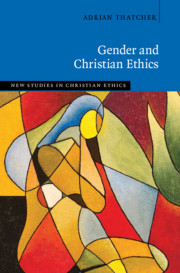Book contents
- Gender and Christian Ethics
- New Studies in Christian Ethics
- Gender and Christian Ethics
- Copyright page
- Contents
- General Editor’s Preface
- Acknowledgements
- Part I Gender and Violence
- Part II Double Vision
- Chapter 4 The Vatican and the War on Gender
- Chapter 5 Women, Men, and Barth
- Chapter 6 The Conceit of Complementarity
- Part III The Human Continuum
- Bibliography
- Index
- Titles Published in the Series (continued from page iii)
Chapter 5 - Women, Men, and Barth
from Part II - Double Vision
Published online by Cambridge University Press: 15 October 2020
- Gender and Christian Ethics
- New Studies in Christian Ethics
- Gender and Christian Ethics
- Copyright page
- Contents
- General Editor’s Preface
- Acknowledgements
- Part I Gender and Violence
- Part II Double Vision
- Chapter 4 The Vatican and the War on Gender
- Chapter 5 Women, Men, and Barth
- Chapter 6 The Conceit of Complementarity
- Part III The Human Continuum
- Bibliography
- Index
- Titles Published in the Series (continued from page iii)
Summary
Karl Barth is perhaps the most justly famous and celebrated Reformed theologian of the twentieth century. He and Balthasar were lifelong friends, and he undoubtedly influenced Balthasar’s own work (Wigley 2007). Yet his treatment of gender, and the characterisation of homosexuality that follows from it, is deeply unsatisfactory. Written over half a century ago, why bother with it at all? My answer is that there is much in contemporary worldwide Christian thought that replicates it, especially among conservative and more fundamentalist people who are inclined to take the ipsissima verba of Scripture as ‘God’s Word’. That is not to claim that millions of people have read Barth or even been directly influenced by him. But I do claim his views on gender are harmful to women, harmful to men who dominate women, and very harmful to gay people should they internalise his a priori understanding of them as perverse. I claim the male–female binary in Barth must be replaced with a better doctrine of human being which does not regard women as secondary to men or heterosexuality to be compulsory. That said, his writings belong to a different time, and his achievements in many other areas – theological, political, ecclesial – deserve enormous respect.
- Type
- Chapter
- Information
- Gender and Christian Ethics , pp. 77 - 95Publisher: Cambridge University PressPrint publication year: 2020

